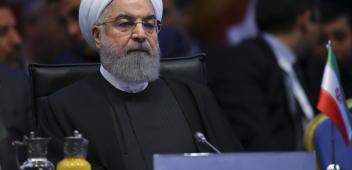Bishop's Iran visit transmits clearest possible diplomatic signal
Bishop's Iran visit transmits clearest possible diplomatic signal
Rodger Shanahan
The Australian Financial Review
24 March 2015
Click here for the online text.

Executive Summary
Foreign Minister Julie Bishop's visit to Tehran in April at the invitation of her counterpart Jared Zarif, is a very astute move by Australia, but the visit also carries with it a few potential downsides.
It has been more than a decade since an Australian foreign minister set foot on Iranian soil and, while there have been good reasons for its diplomatic isolation, it can be argued this visit is an example of the sort of creative middle-power diplomacy Kevin Rudd talked about but rarely achieved.
Tehran seeks a place in the international order commensurate with its own view of its importance as a regional power. The regime argues its isolation is the price Iran is required to pay for its independence, but in reality it understands the economic sanctions it labours under inhibit the growth of its national power.
This isolation has not been total though. Most European countries remain represented diplomatically, but of Tony Abbott's beloved Anglosphere, only Canberra and Wellington currently operate embassies in Tehran.
The continued presence of our embassy in Tehran will have been noted positively by the Iranians. However, deeper relations require a greater depth of engagement than simply a diplomatic presence. The visit of a foreign minister is a good start in this regard. For Washington, the fact a close ally is sending such a senior minister will send another positive signal to Tehran about the benefits of serious engagement. The long-running nuclear negotiations have meant the Americans no longer have the need they previously had for trusted interlocutors, but the messaging is positive.
There are, of course, valid reasons for Australia to take advantage of this moment to advance our interests with Iran. It represents possibly the last large underdeveloped economic market that will be opened up in the next few years. The Europeans have already been hosting investment summits in anticipation of a freeing up of the sanctions following a nuclear deal, and it would be remiss of Canberra if it didn't seek to give Australian exporters the best opportunity to take advantage of a future market that, while difficult to penetrate, will be lucrative in the long run for those that do.
And while trade and investment are certainly very important reasons for establishing closer bilateral relations, the ongoing presence of Australian Defence Force troops in Iraq (a country where Iran has significant influence) provides a more immediate rationale for talks - the ability to engage Tehran in discussions if required can be no bad thing. The long-term threat from radical, jihadist foreign fighters also provides another issue where Canberra and Tehran share common security concerns, even though they remain poles apart on others.
Of course, there are diplomatic shoals to be avoided in this visit. Firstly, there is the very real regional rivalry between Saudi Arabia and Iran that dictates a visit to Tehran is balanced against a likely visit to Riyadh (or another close Gulf ally) as part of the same trip. When a visit is undertaken to a $300 million trading partner that is a rival to a $2.2 billion partner with 10,000 students studying in your country, it is only sensible to ensure the latter is afforded a degree of diplomatic equivalence.
The Israeli Prime Minister's speech to the US Congress earlier this month left no one in any doubt as to how he sees Iran and, now that he has been re-elected, the Foreign Minister's visit will likely not be welcomed in Jerusalem.
The timing of the visit, though, carries perhaps the greatest risk.
With nuclear negotiations continuing apace and a framework agreement due by the end of March, there is always the risk the talks could stall further or even, at worst case, derail. However, the fact the visit is planned to take place so soon after the framework deadline would appear to indicate there is a degree of guarded optimism an agreement can be reached by this date.
That being the case, Julie Bishop could possibly be the first cab off the rank in what is likely to be a growing list of senior political visitors. And while nothing can ever be guaranteed, first-mover advantage sometimes holds as much cachet in diplomacy as it does in business.
Associate Professor Rodger Shanahan is a Research Fellow at the Lowy Institute for International Policy and a Fellow at ANU's National Security College.


